12 Tips on How to Build Trust in Your SaaS Product
When it comes to building trust in a SaaS product, customers have a lot of concerns that need to be...

We all make mistakes, and brands do too. From forgetting a friend’s birthday or saying a questionable joke, to messing up an order or posting a tweet that puts the PR team’s jobs at risk: mistakes are bound to happen.
That’s the obvious bit. The not-so-obvious bit has to do with the consequences of mistakes. Why? Because mistakes are not born equal.
Some are minor and can be brushed off, but others are unforgivable and can lead to companies’ downfall. Additionally, different people have different tolerance levels, which further adds a layer of complexity that businesses have to deal with.
Businesses therefore face a lot of questions: When are consumers willing to give them the benefit of the doubt? How should businesses handle mistakes? How can they avoid needing to rely on the benefit of the doubt in the first place?
The good news is that we have some answers. Read on for interesting insights from a new survey by Trust Signals. The information we'll share in this article can directly impact whether a customer will give you the benefit of the doubt. Spoiler: building brand trust will get you a long way.
In this article, we’ll go over:
Trust Signals used Pollfish to survey 600 U.S. adults, from different races and ethnicities, earning various incomes, with education levels ranging from middle school to post-graduate on trust with companies. Here are our key statistics and findings:
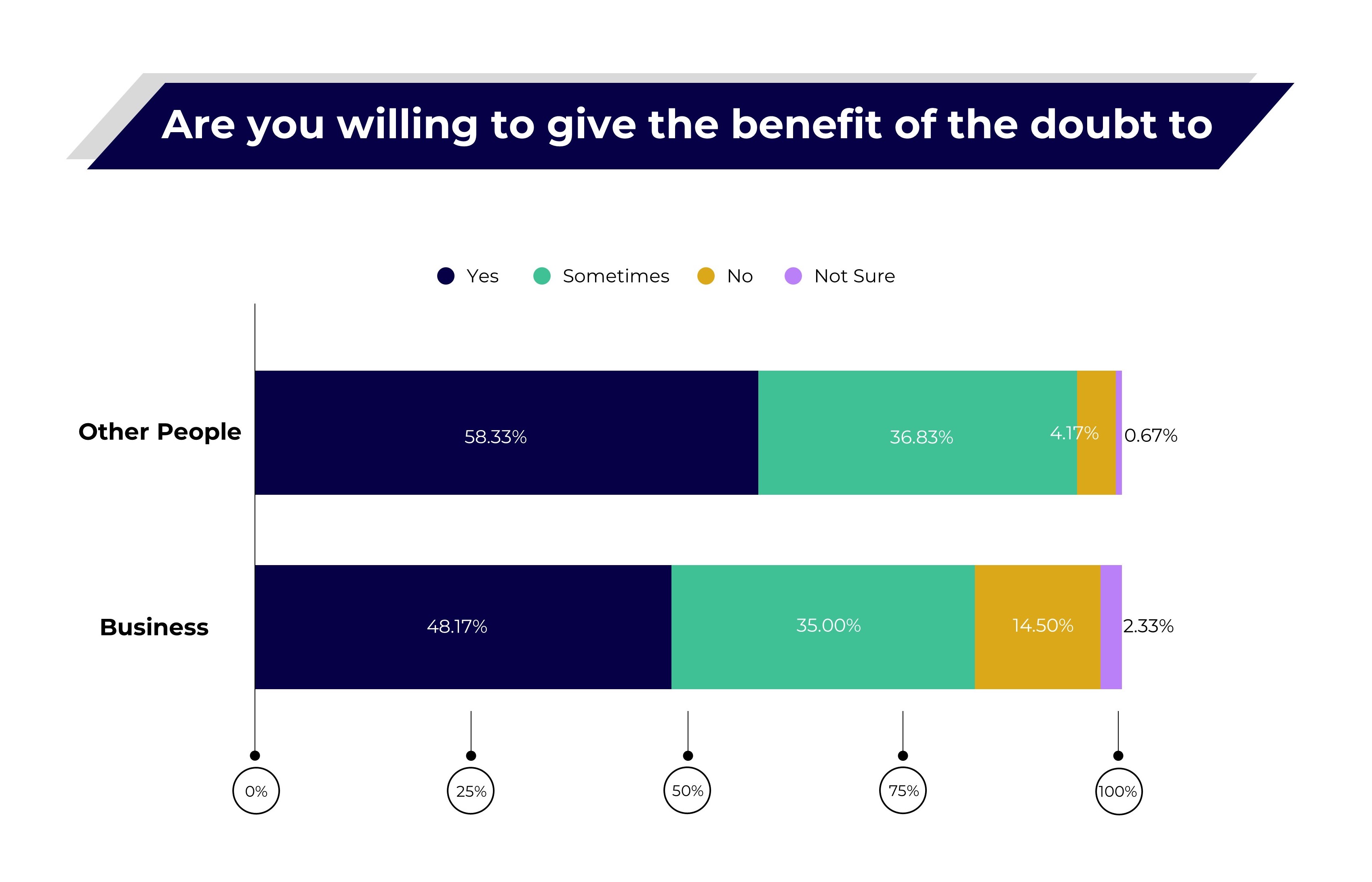 Source: The Benefit of the Doubt: A Survey by Trust Signals, September 2022. Base: Consumers: 600.
Source: The Benefit of the Doubt: A Survey by Trust Signals, September 2022. Base: Consumers: 600.
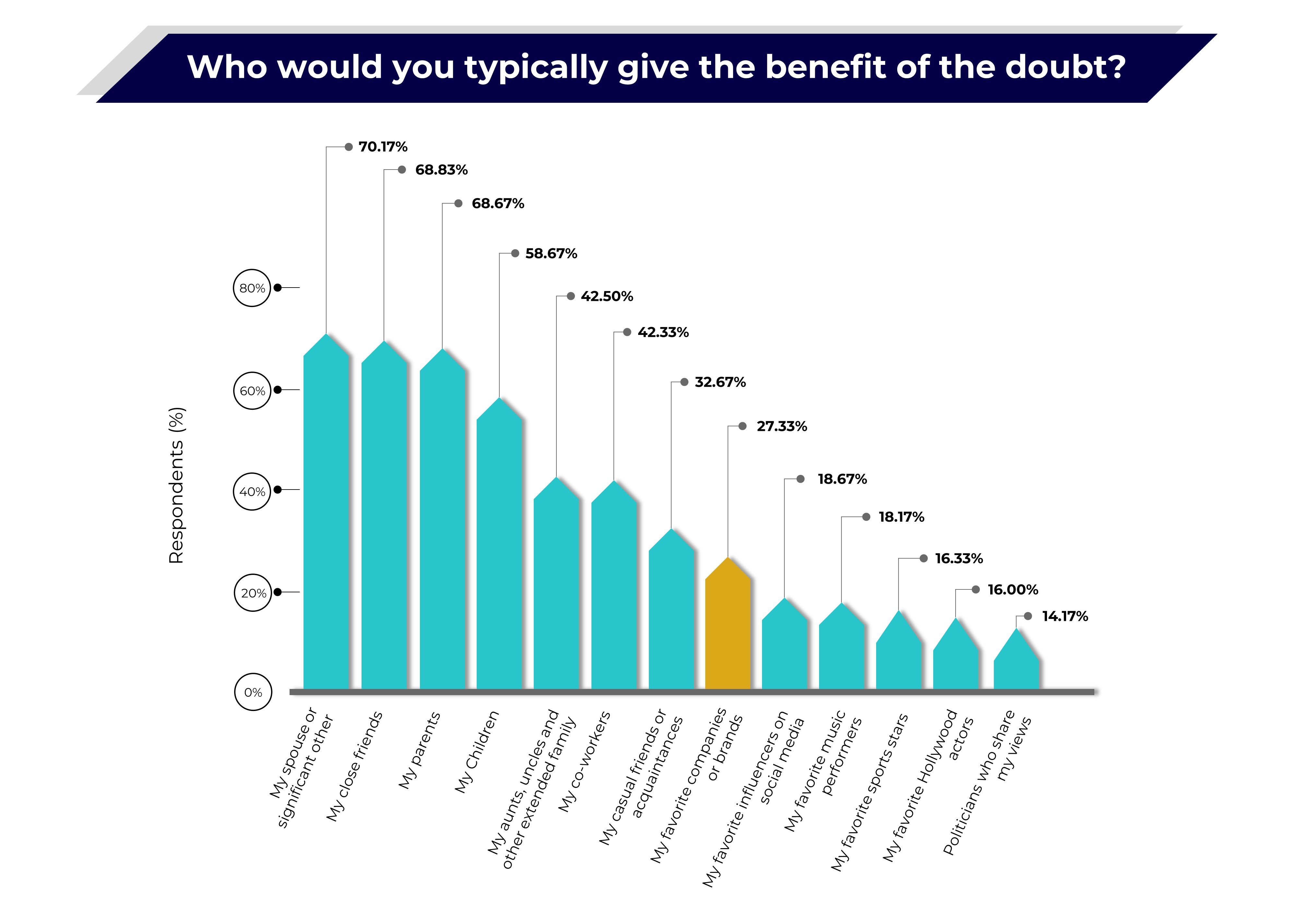
Source: The Benefit of the Doubt: A Survey by Trust Signals, September 2022. Base: Consumers: 600.
.jpeg?width=4000&name=Slide3%20(1).jpeg) Source: The Benefit of the Doubt: A Survey by Trust Signals, September 2022. Base: Consumers: 600.
Source: The Benefit of the Doubt: A Survey by Trust Signals, September 2022. Base: Consumers: 600.
The most common definition you’ll find (as stated on Merriam-Webster) is as follows: “the state of accepting something/someone as honest or deserving of trust even though there are doubts”.
There’s an important phrase we’d like to highlight in the above definition: “deserving of trust”.
You see, we’ve found that although 58% of people surveyed believe in giving people the benefit of the doubt, less than half (48%) generally believe in giving businesses the same privilege.
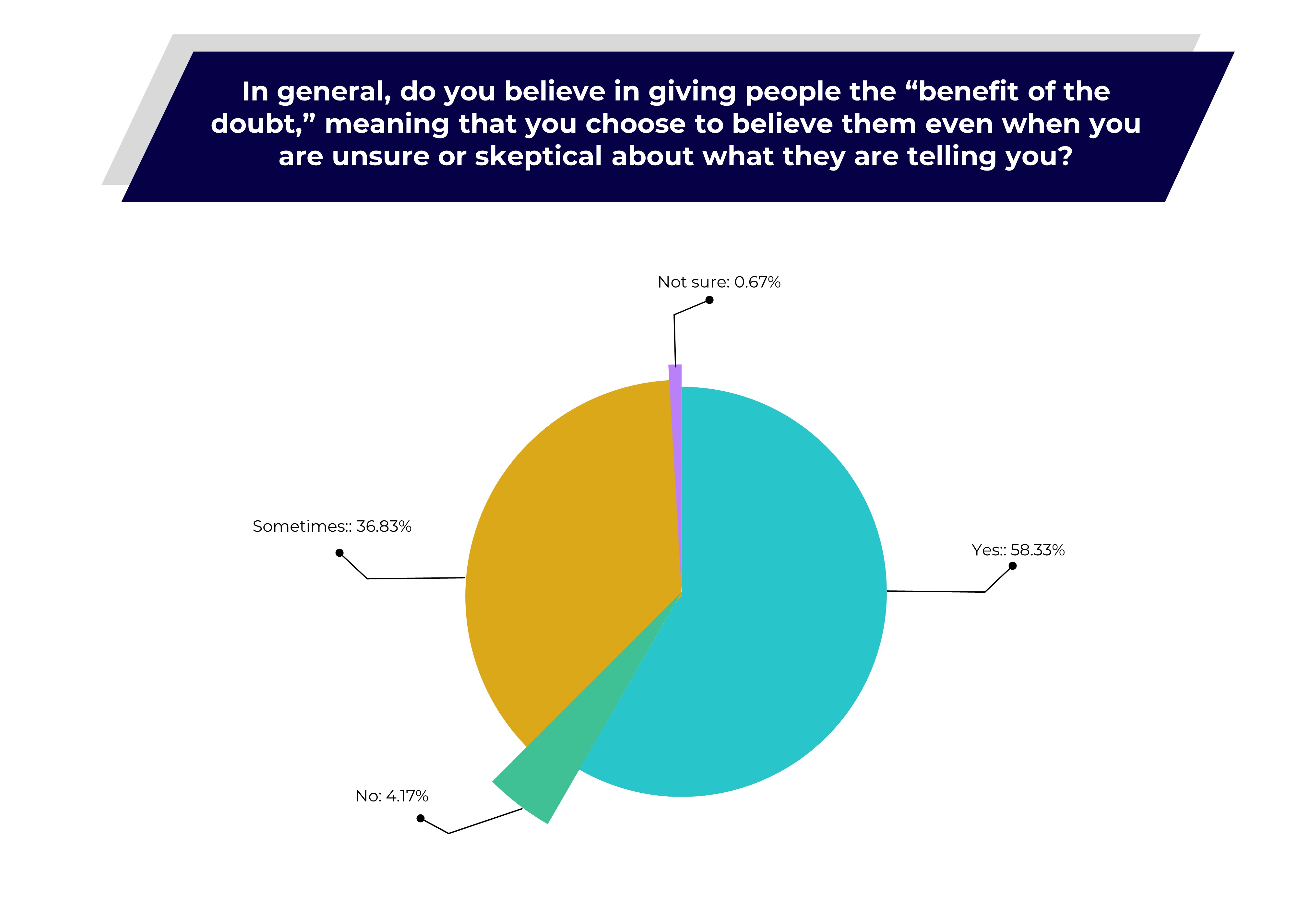
Source: The Benefit of the Doubt: A Survey by Trust Signals, September 2022. Base: Consumers: 600.
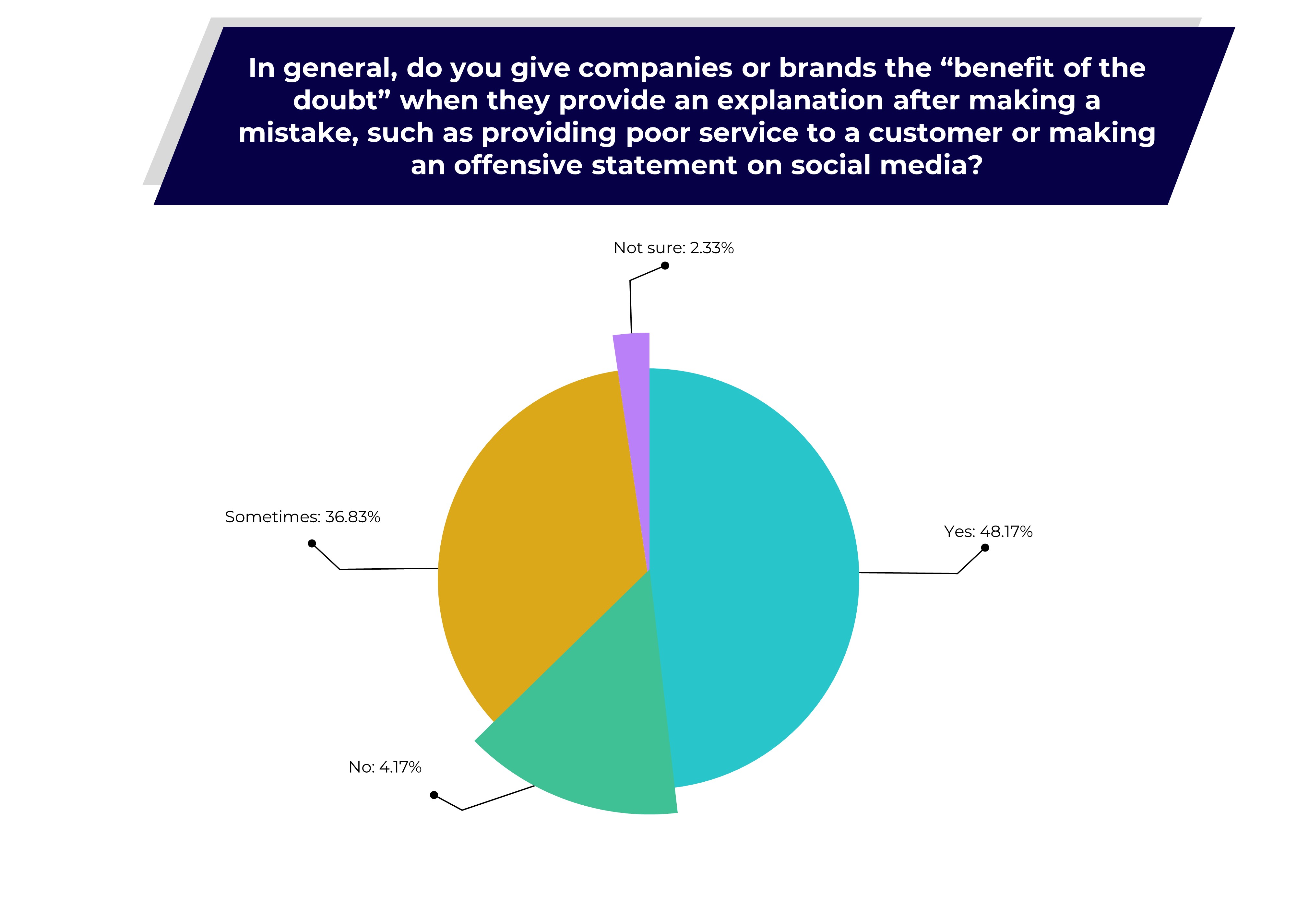
Source: The Benefit of the Doubt: A Survey by Trust Signals, September 2022. Base: Consumers: 600.
This is one of the most important notes you need to keep in mind throughout this entire article: most consumers’ default thought process involves not granting businesses the benefit of the doubt. In other words, businesses need to earn the benefit of the doubt, and thus actively build trust.
We’ll go into details about how they – and you – can do that below, but we’ll first share some interesting details about how trusting other people differs from trusting brands and businesses.
This survey proved that it’s harder for businesses to get the benefit of the doubt than for people. This has all to do with trust, as giving someone the benefit of the doubt means to trust someone or something even though there are doubts. But who are we willing to trust? And when are we willing to trust them? Let’s take a closer look at some of the results.
.jpeg?width=4000&name=Slide2%20(1).jpeg)
Source: The Benefit of the Doubt: A Survey by Trust Signals, September 2022. Base: Consumers: 600.
One question we were excited about asked: “Who would you typically give the benefit of the doubt?”. When given 13 different options to choose from (this was a multiple selection question, so respondents could’ve chosen as many or as little options as they liked), people chose:
…over their favorite companies or brands (27.33%).
But at the same time, they chose their favorite companies or brands over:
What does that tell us? Personal relationships matter when it comes to who people are willing to give the benefit of the doubt. The closer the relationship, the more likely someone is to give them the benefit of the doubt. This isn’t surprising, as we humans are social animals and have evolved to trust people we have a personal relationship with more than strangers.
But why would more people give their favorite companies or brands the benefit of the doubt than their favorite social media influencers, musicians, sports stars, or Hollywood actors?
This can be explained by that we have a much more personal relationship with our favorite brands than with celebrities.
You see, we see our favorite brands almost every day, and in some cases, we use their products or services on a daily basis. In other words, we have a lot more interactions with businesses than we do with celebrities, so this might result in us feeling like we have a more personal relationship with them.
We've just seen that people more readily blame businesses than people they know, but that's not the end of it. They are also slower to forgive them. Here are the results of 2 questions that demonstrate that:
Notice how similar the 2 questions are. In both, a mistake was made, and an apology followed. The respondents, however, did not treat them similarly.
In the case of the drunk co-worker, the most selected answer was “Yes, because we all make mistakes”! This shows how people naturally forgive other people because they can relate to them.
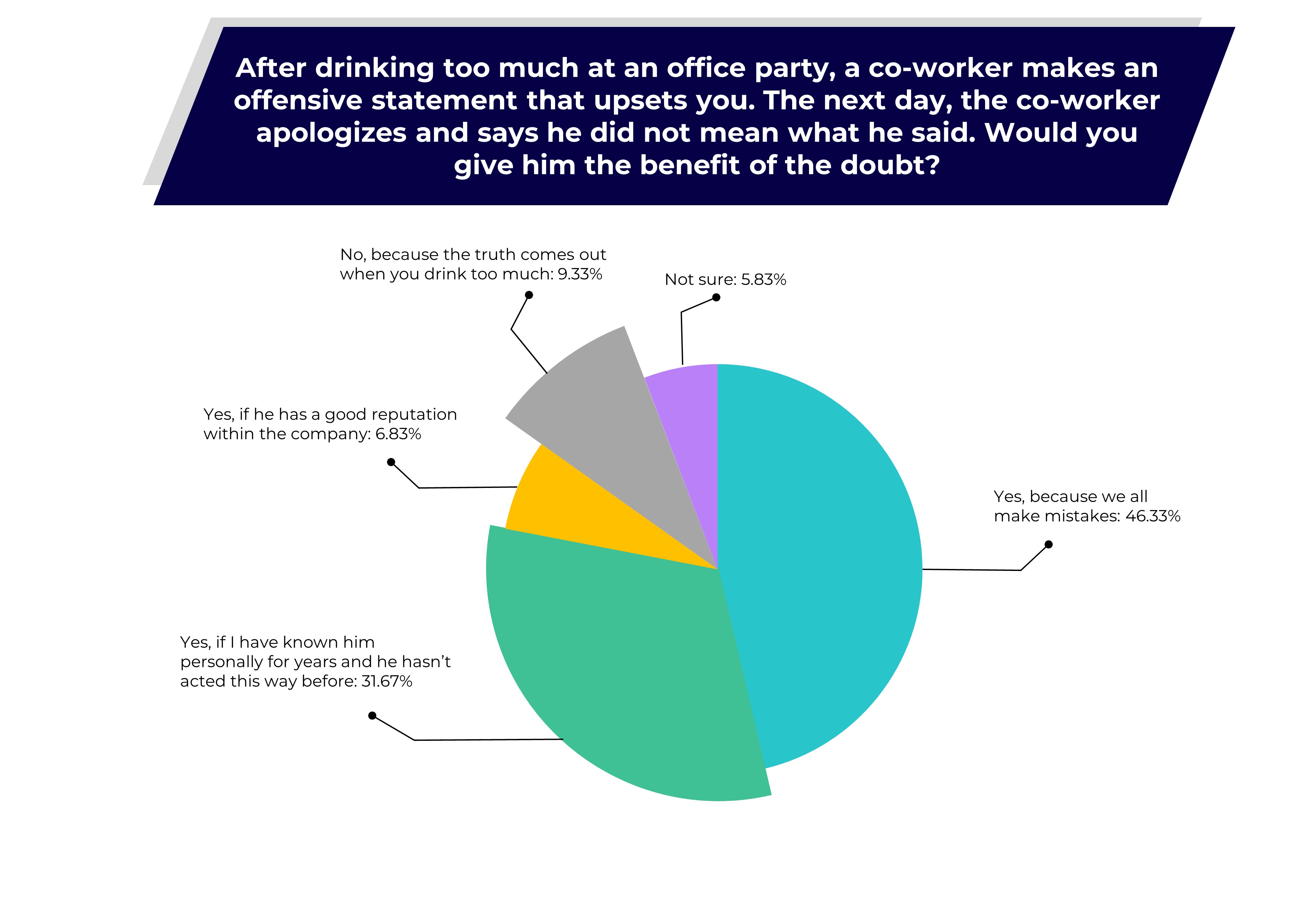
Source: The Benefit of the Doubt: A Survey by Trust Signals, September 2022. Base: Consumers: 600.
In the case of the brand, though, the most selected answer was “The brand has a long history of supporting women's causes”! Notice how much bigger of an ask that is? The respondent is saying that they would need to see some evidence that the brand really does care about women before they're willing to forgive them.
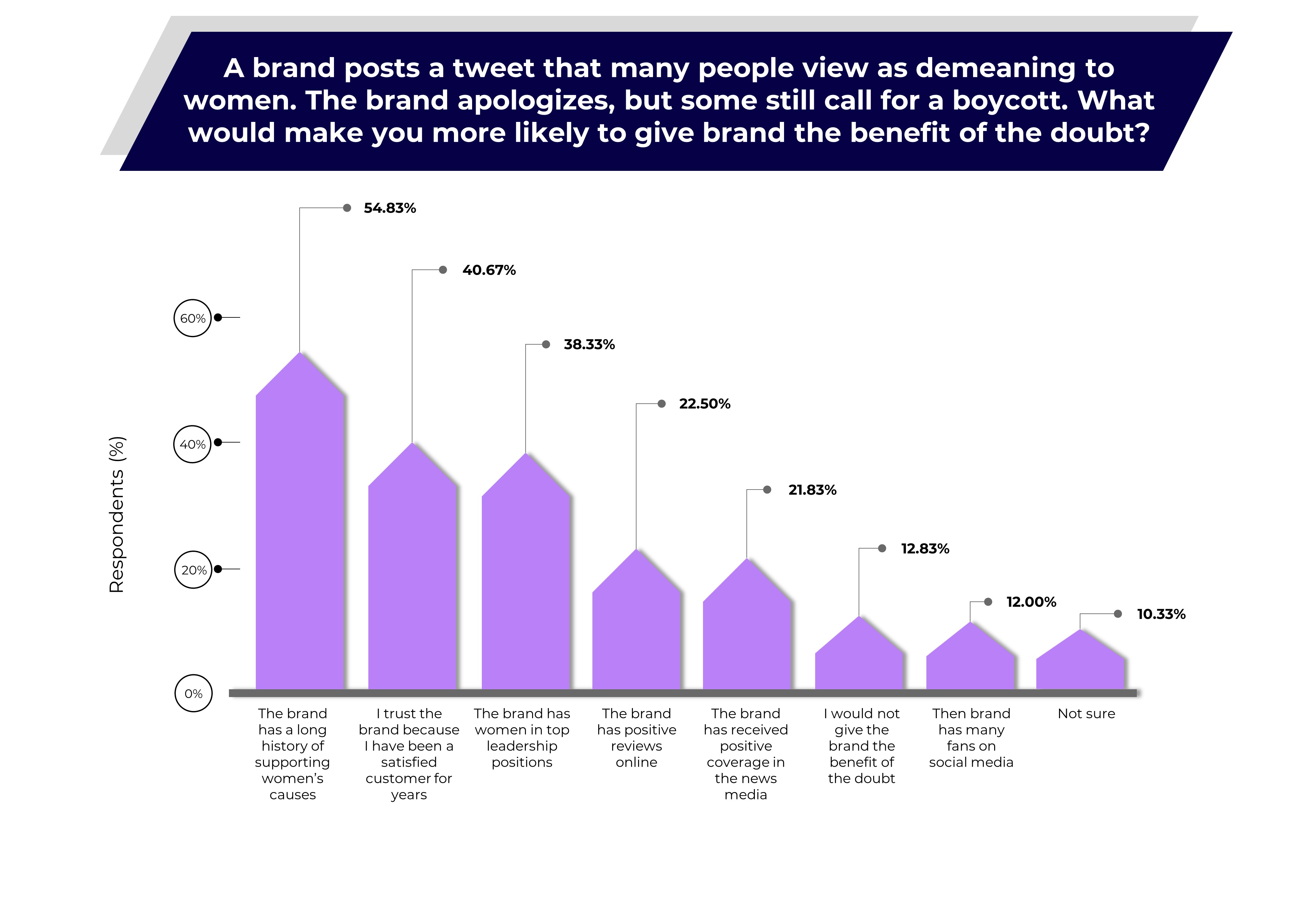 Source: The Benefit of the Doubt: A Survey by Trust Signals, September 2022. Base: Consumers: 600.
Source: The Benefit of the Doubt: A Survey by Trust Signals, September 2022. Base: Consumers: 600.
This is an important difference, and one that businesses need to be aware of. When people make a mistake, we're quick to forgive them because we know that everyone makes mistakes. But when businesses make a mistake, we're much less likely to forgive them unless they can show us that they really do care about the issue at hand.
Now that you know that trust can be lost very easily and quickly, it's quintessential to adopt strategies in your company to build brand trust and gain consumers' benefit of the doubt. We’ll discuss strategies that we derived from our research and are therefore proven to increase the chances of gaining the benefit of the doubt.
Here are some of the most important questions asked in this survey, along with their most selected answers:
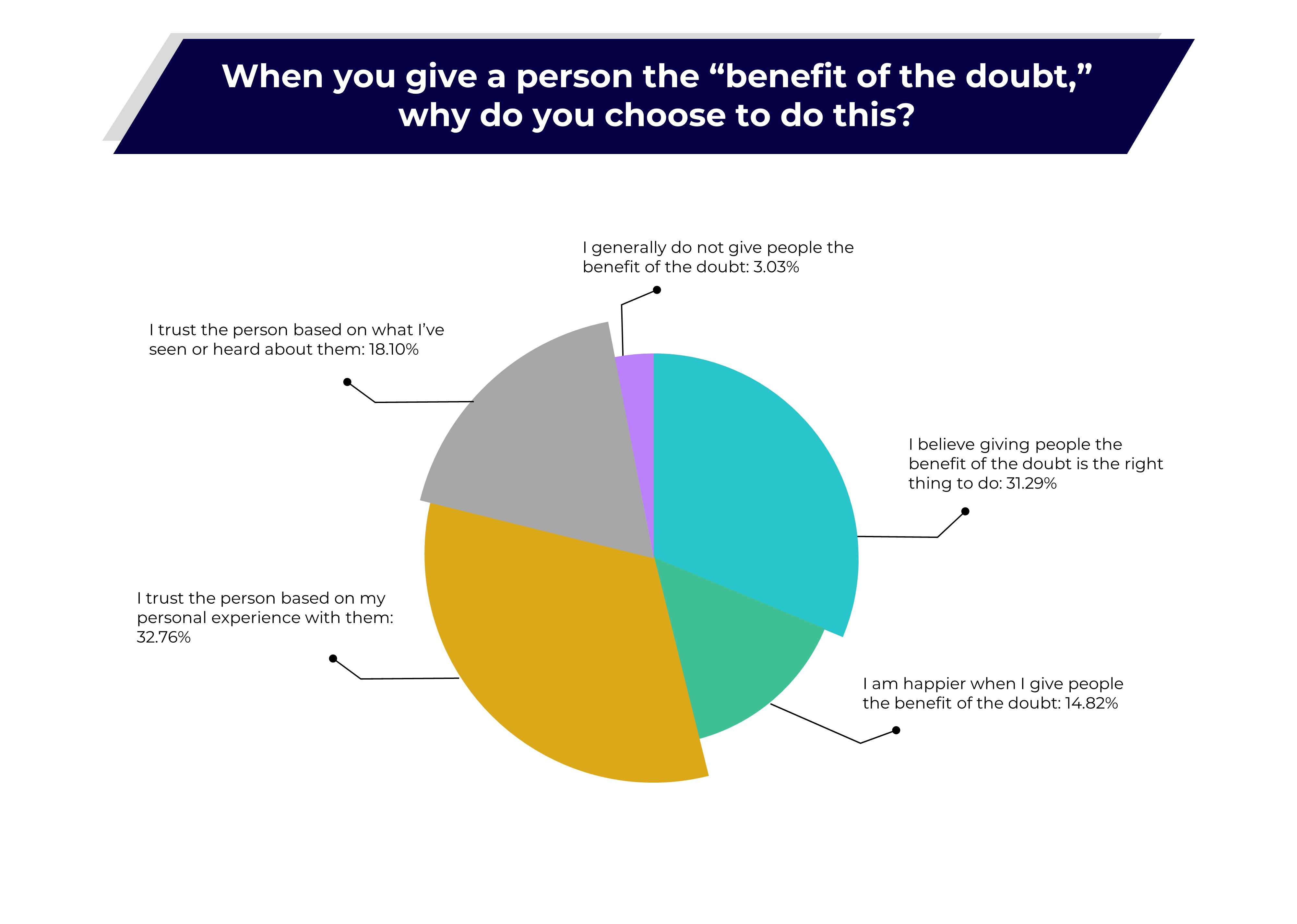
Source: The Benefit of the Doubt: A Survey by Trust Signals, September 2022. Base: Consumers: 600.
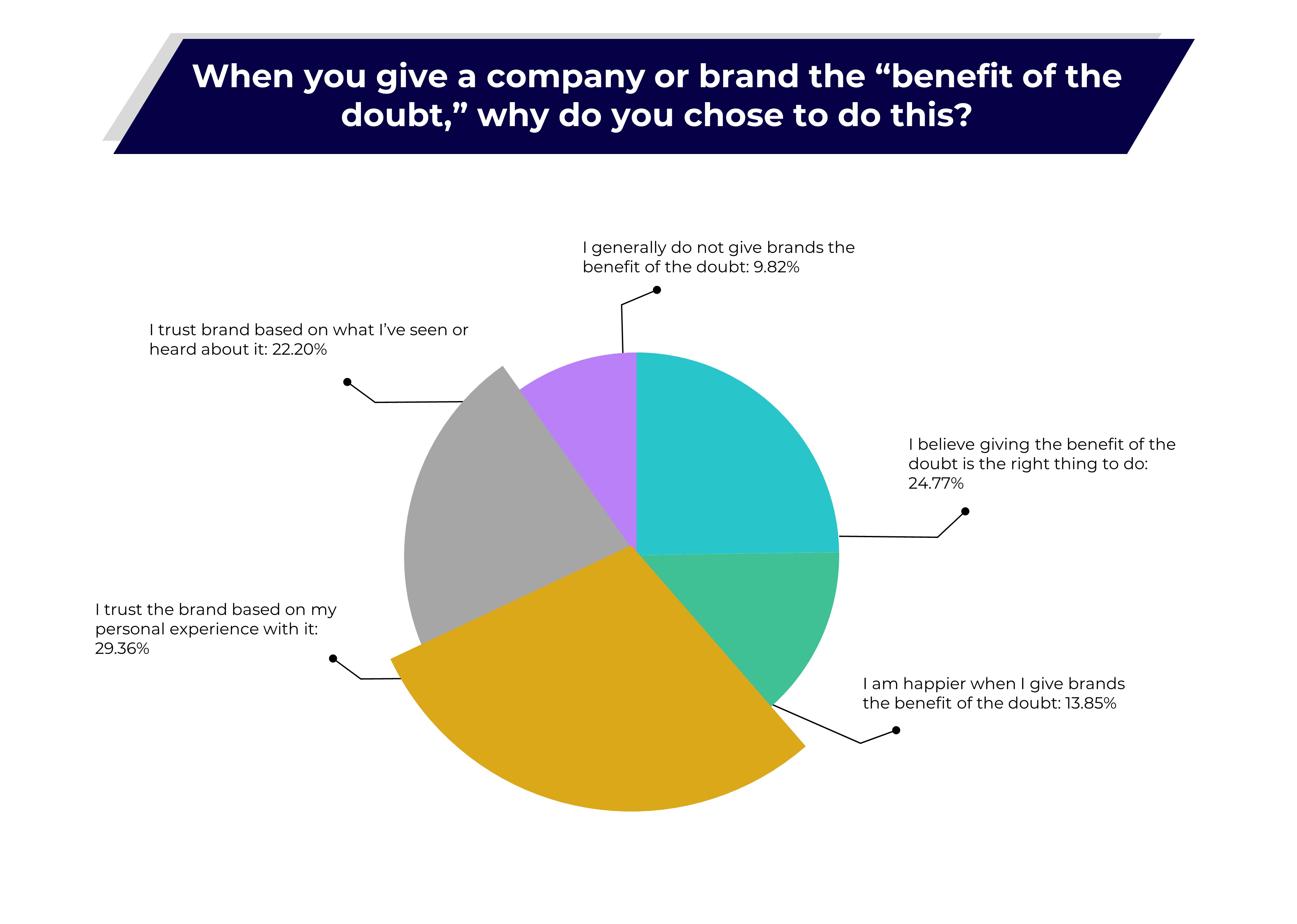
Source: The Benefit of the Doubt: A Survey by Trust Signals, September 2022. Base: Consumers: 600.
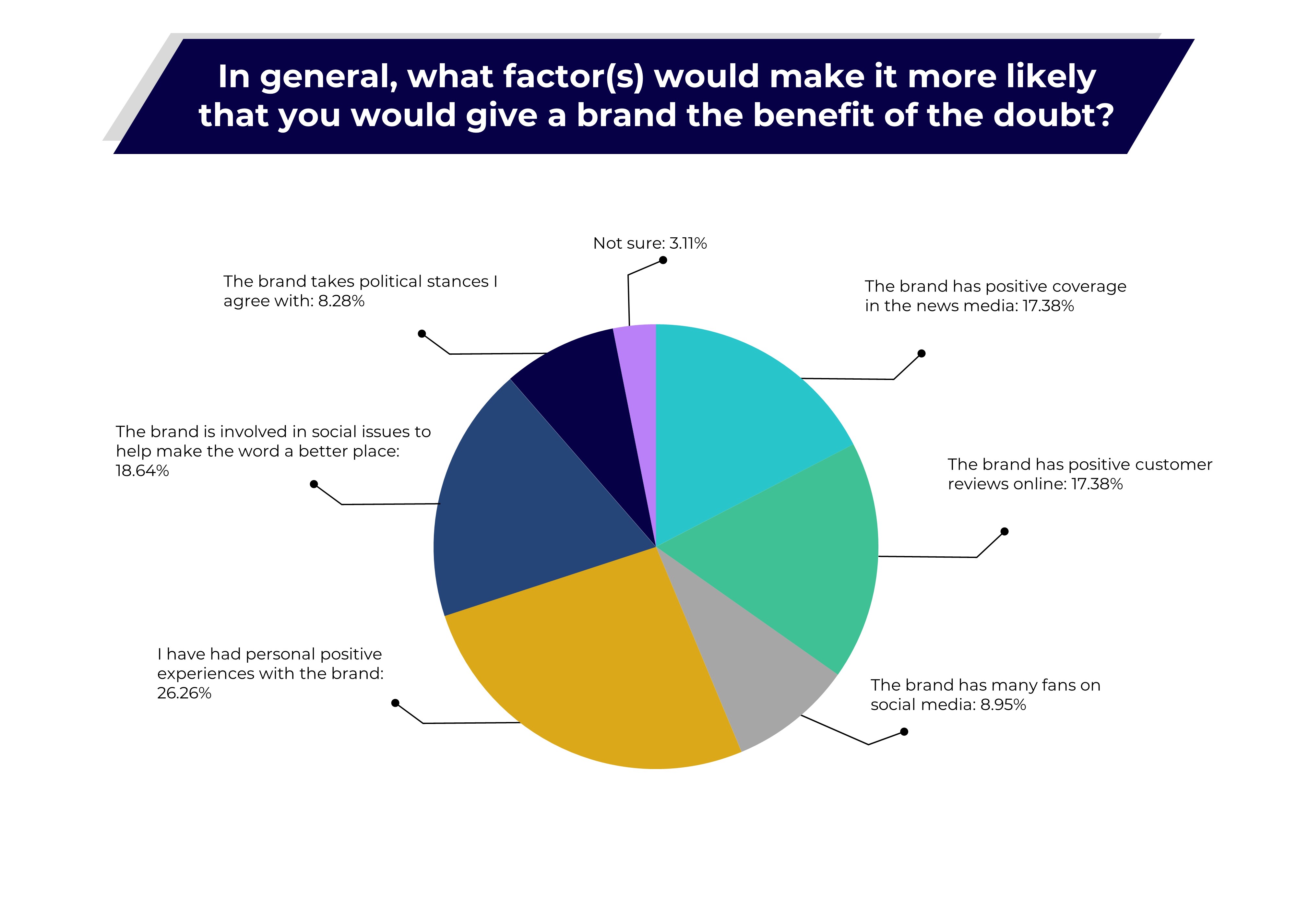
Source: The Benefit of the Doubt: A Survey by Trust Signals, September 2022. Base: Consumers: 600.
The lesson here is evident: consumers base their trust (in other people and brands) on their own personal experiences, much more than on what other people say, or what they hear in the media or from politicians.
The takeaway for businesses? Focus on the customer experience.
Of course - first impressions count for a lot, so optimize your onboarding process and invest in good pre-sales customer support.
But be careful not to become complacent. Losing customers isn't the same as missing out on new ones - because the longer a customer has been doing business with you, the more likely they're to give you the benefit of the doubt.
In other words, gaining consumers’ benefit of the doubt is a marathon, not a sprint.
Here are some open-ended responses which prove that:
That’s right – long-time customers that had great personal experiences are willing to forgive. They can even go as far as forgiving something as outrageous as racism!
.jpeg?width=4000&name=Slide3%20(1).jpeg)
Source: The Benefit of the Doubt: A Survey by Trust Signals, September 2022. Base: Consumers: 600.
In the previous paragraph, we discussed the importance of customer experience. But this is not the only factor that influences the likelihood of getting the benefit of the doubt. Other factors that play an important role are:
These factors show that it’s even though personal experience is the leading factor, consumers also care about what others are saying about the brand. In other words, brands need to focus on building a great online reputation.
This may sound like an obvious statement: of course, a company with bad reviews will have a harder time getting the benefit of the doubt. But that's not all. A company without an online reputation is also at a disadvantage because people have no frame of reference to decide whether to trust it after making a mistake.
So, how to build your online reputation? We've written different blog posts about reputation management, but to get you started, here are some quick tips:
First, focus on delivering a great customer experience, as we discussed before. Then, make sure to actively encourage customers to leave reviews on a platform such as Trustpilot. For example, by sending them an email after they make a purchase, or by displaying prominently displayed user-generated content on your website or social media pages. Finally, keep an eye on what's being said about you online, and respond quickly and professionally to any negative reviews or comments.

Source: The Benefit of the Doubt: A Survey by Trust Signals, September 2022. Base: Consumers: 600.
When looking at the same graph, another factor influencing your chances of getting the benefit of the doubt is how much consumers perceive your brand as being focused on making the world a better place. In our survey, this was selected by 18.64% of respondents as one of the reasons they would give a company the benefit of the doubt.
Why? Probably because consumers see it as a sign that the company is committed to doing good, and not just making a profit. In other words, brands that focus on making the world a better place are more likely to be trusted - even when they make mistakes.
If you want to take this route, it's important to be authentic about it. Don't just jump on the latest social cause because it's trendy - make sure it's something you really care about, and that you're taking concrete steps to support it.
Focusing on this factor without intrinsically caring about the cause can backfire. If consumers think you're just trying to exploit a social cause for profit, you can forget about getting the benefit of the doubt.
Here’s a great philosophical razor to keep in mind called Hanlon’s razor: “Never attribute to malice that which can be adequately explained by stupidity.”
Consumers might forgive on their own, but they will likely not forget. This is why you need to take action: when a mistake happens, do not swipe it under the rug. Instead, bring it to light, and frankly admit whatever fault you’ve made and focus on how you’ll improve for the future.
In other words, a consumer can forgive your company’s mistake, and they probably won't hold a grudge nor leave a bad review, but they will likely never do business with you again, and they will most definitely not speak too highly about your business either.
We completely understand that when a mistake happens, admitting fault is a hard choice to make – but you'd much rather have the consumer think that your mistake originates from ineptness, and not from any unwillingness on your part to care about the customer. After all, not many customers adopt the above Razor, so if you'd like to gain the benefit of their doubt, remove any doubt they may have as to why a mistake happened – and do something about it.
Here is some qualitative feedback that drills that in:
Notice in the above examples how logistical issues, even ones that are not caused by your company, can put you under pressure.
The solution? Address these problems, and, when fixing them, go the full mile – it’s a surefire way to gain a happy customer and a new champion of your business. Here are some stories about businesses that went the full mile:
If you've found any of the above statistics alarming, we don't blame you. It's quite worrying to know how unforgiving customers can be. Here's the bright side, though: knowing this information and managing your business accordingly is much better than not knowing it and dumping resources into things that will likely not help you gain consumers' benefit of the doubt or letting once-loyal customers slip through the cracks too easily.
After all, mistakes are bound to happen, and some customers will have unfavorable experiences every now and then. Being prepared for that and knowing how to deal with it can help you, when mistakes really do happen, gain the benefit of customers' doubt instead of suffering its detriment.
We hope the above tips can help you leverage a powerful tool that often goes under marketers' radars - the benefit of the doubt - to retain customers, protect your brand's reputation, and grow consumers' trust in your business.
We know that building trust is challenging, this is why Trust Signals is here for you. Here are a few recommended readings to start building and maintaining brand trust:

Carolina Posma is a writer for Trust Signals.

When it comes to building trust in a SaaS product, customers have a lot of concerns that need to be...

Note: At the outset of his new book, Beyond Expertise: How Trust, Vision and Delivery Will Redefine...
Leave a Comment